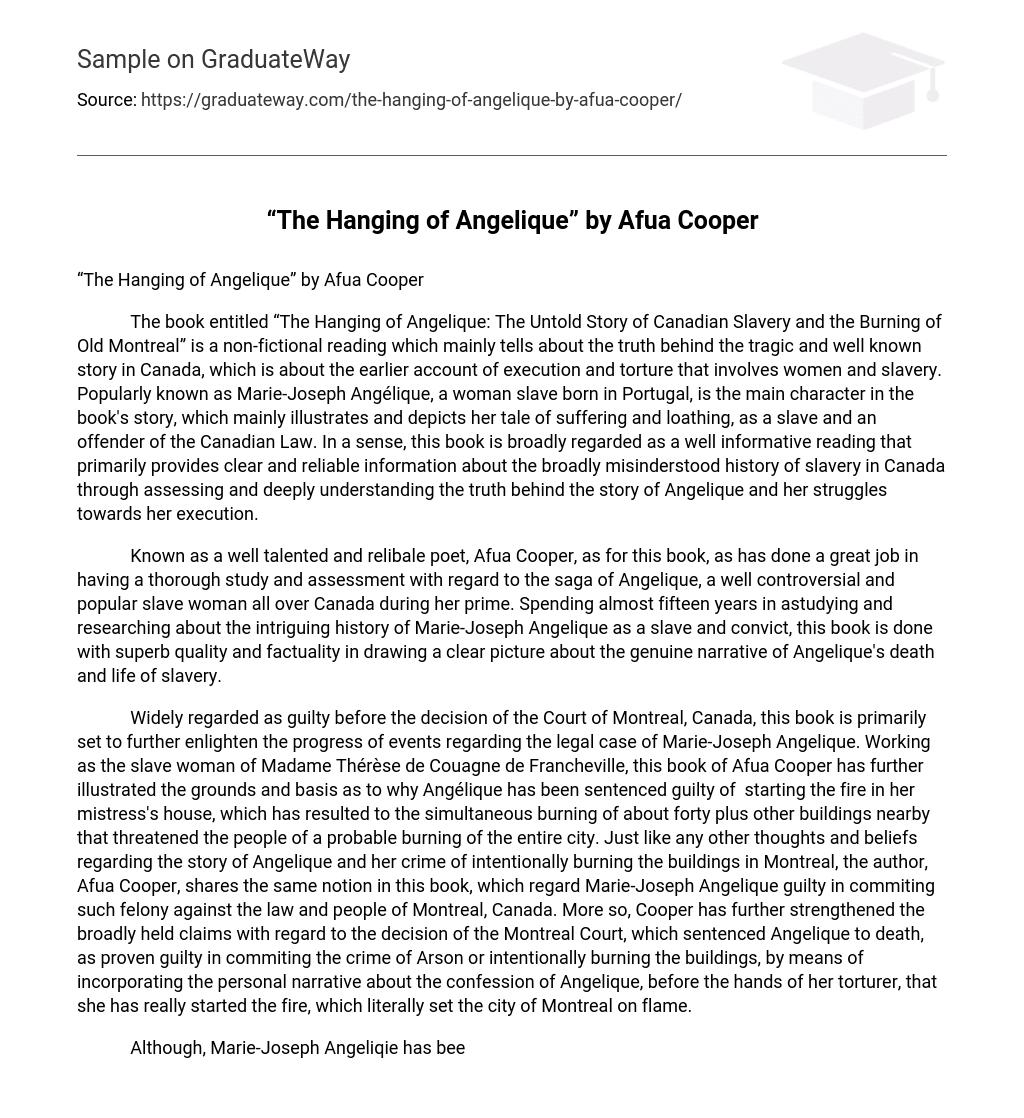The book entitled “The Hanging of Angelique: The Untold Story of Canadian Slavery and the Burning of Old Montreal” is a non-fictional reading which mainly tells about the truth behind the tragic and well known story in Canada, which is about the earlier account of execution and torture that involves women and slavery. Popularly known as Marie-Joseph Angélique, a woman slave born in Portugal, is the main character in the book’s story, which mainly illustrates and depicts her tale of suffering and loathing, as a slave and an offender of the Canadian Law. In a sense, this book is broadly regarded as a well informative reading that primarily provides clear and reliable information about the broadly misinderstood history of slavery in Canada through assessing and deeply understanding the truth behind the story of Angelique and her struggles towards her execution.
Known as a well talented and relibale poet, Afua Cooper, as for this book, as has done a great job in having a thorough study and assessment with regard to the saga of Angelique, a well controversial and popular slave woman all over Canada during her prime. Spending almost fifteen years in astudying and researching about the intriguing history of Marie-Joseph Angelique as a slave and convict, this book is done with superb quality and factuality in drawing a clear picture about the genuine narrative of Angelique’s death and life of slavery.
Widely regarded as guilty before the decision of the Court of Montreal, Canada, this book is primarily set to further enlighten the progress of events regarding the legal case of Marie-Joseph Angelique. Working as the slave woman of Madame Thérèse de Couagne de Francheville, this book of Afua Cooper has further illustrated the grounds and basis as to why Angélique has been sentenced guilty of starting the fire in her mistress’s house, which has resulted to the simultaneous burning of about forty plus other buildings nearby that threatened the people of a probable burning of the entire city. Just like any other thoughts and beliefs regarding the story of Angelique and her crime of intentionally burning the buildings in Montreal, the author, Afua Cooper, shares the same notion in this book, which regard Marie-Joseph Angelique guilty in commiting such felony against the law and people of Montreal, Canada. More so, Cooper has further strengthened the broadly held claims with regard to the decision of the Montreal Court, which sentenced Angelique to death, as proven guilty in commiting the crime of Arson or intentionally burning the buildings, by means of incorporating the personal narrative about the confession of Angelique, before the hands of her torturer, that she has really started the fire, which literally set the city of Montreal on flame.
Although, Marie-Joseph Angeliqie has been convicted and proven guilty in burning the house of her mistress and other forty plus building in the City of Montreal, she still denies the fact that she has started the fire and intentionally burn the other establishments around the city. However, this sturdy stand of Angelique has never been the same when she undergo the process of torture that is basically designed to force her confess for the felony that she really committed. Through the painful process of brodequin, the method of torture used to Angelique, words of agony and intense pain has come out to her mouth and ended confessing the truth that she did start the fire, which made the other building on fire. More so, this book also shows how badly the slave women, who committed crimes, are treated in forcing them to confess for their crime by means of torture. As for the case of Angelique, the torture that she has been through is observable as intensely painful with her using the words “You are killing me,” “I did it by myself “ and “Hang me,” in every hit and strike that she would receive from her torturer[1]. More so, through the unbearable physical suffering of Angelique from all the torture she has received, she has loudly confess to the Judge about the crime she committed and utter the words “I said it was I who did it, avec un rechaud, with a small stove. No one told me to do it, monsieur, a bad thought came to me.”[2]
Throughout the notions and information rendered in the book, it is higher grounds that this reading is a well informative and useful reference that highlights the history of Canadian Women and how they are treated awfully in instances that they have committed felony and sin against the people and the law. More so, the composition of this book is useful in such a way that this reading renders a clear statement that Canadian Women, back in the days, do not have that exemption or immunity in facing legal death penalties and undergoing the process of torture when crime is committed.
In the end, this book has indeed provided that clear notion, which states the awful stance of Canadian Women in facing their own punishments and set of sufferings in paying for the crimes and/or sins that they committed, back in the days when the Law is still open to the practice of torture in seeking for the truth. More so, this book has also shown that Candian Women, especially the slaves in the case of Angelique, has an equal significance in Canadian Law, as seen evident to the story of Angelique when the court decided to give her the more humane death penalty unlike the earlier proposed motion to burn her body alive.
Bibliography
Cooper, Afua. The Hanging of Angelique: The Untold Story of Canadian Slavery and the Burning of Old Montreal. USA: University of Georgia Press, 2007.
[1] Afua Cooper, The Hanging of Angelique: The Untold Story of Canadian Slavery and the Burning of Old Montreal. (USA: University of Georgia Press, 2007.), 19
[2] Cooper, The Hanging of Angelique: The Untold Story of Canadian Slavery and the Burning of Old Montreal, 19.





